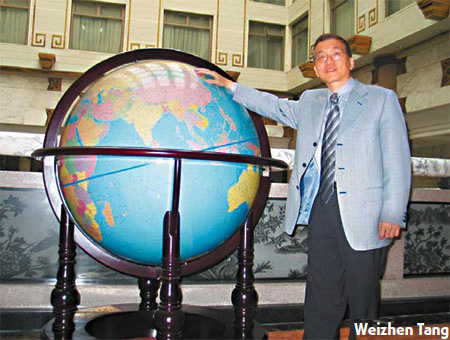
|
BIZCHINA> Top Biz News
 |
|
Fund manager denies he's a Chinese Madoff
By Darcy Keith (China Daily)
Updated: 2009-04-27 08:01
 Few people other than Weizhen Tang would view the shutting down of his hedge fund and the investigations by the financial watchdogs of two countries as a potential boon for business. "In trading, you have to see the opportunity, have the vision, and see the value," Tang said. "You need to see value where nobody else sees it." And it takes a very keen eye to see the value in Tang's current situation. His Weizhen Tang Corp and Oversea Chinese Fund Ltd Partnership has been accused of defrauding clients in the US and Canada of tens of millions dollars.
But while these accusations might have sent a lesser, self-anointed financial guru scurrying from the spotlight, Tang welcomed it. A fervent follower of the no-news-is-bad-news policy, Tang said he believed that with his increased media exposure investors will flock to him like never before - once he clears his name, that is. "For me, the crisis I'm experiencing, people think it's very big, and it is big," Tang said. "But I see it as a big opportunity for me. When more information comes out, people will know me better, they will love me better." Tang's troubles started at the end of January, when he held a public demonstration of his investment strategy at his Toronto office and wasn't able to match the reported results of his funds, according to court documents. Some investors lost confidence in him and soon demanded their money back. But Tang advised them the funds weren't ready yet and to wait six months. As a result, some of the investors then went to the authorities. The accusations against Tang have rattled the Chinese community in Toronto, where he had been well known and respected. He had helped fund the Chinese Lunar New Year Show and put on investment summits that featured economists from China and the US. "That's why I think a lot of Chinese people got to know him," said one of Tang's investors, who asked not to be identified. "Each time they had a public activity he always stood out and gave some kind of support. He used this to attract a lot of new investors." Tang solicited wealthy investors, although some of his clients were also new Chinese immigrants who had to borrow to help pay for the minimum investment of C$150,000 required to participate in his Oversea Chinese Fund. He also co-owns a US fund, known as WinWin Capital Management, with most of its investors living in Texas. According to court filings, he had attracted more than 200 investors who gave him roughly $75 million to manage, about $35 million of which has so far been paid out. The Ontario Securities Commission alleges Tang may have inflated returns, fabricated some financial statements, and used money from new investors to pay redemptions to existing ones. A cease trade order will be in place against Oversea Chinese Fund until at least September. Tang denied he was operating a Ponzi scheme, saying the funds he was given went toward investing in the market. His strategies were "creative" and "revolutionary", as he puts it, but he insists "I did always put investors' interest first". He also said that more than 90 percent of his investors are still supportive of him. Tang's attorney, Hugh Lissaman of Toronto's Lissaman & Associates, said forensic accountants are now reviewing Tang's business. Kelvin Li, news director of a Toronto-based Chinese-language website, attended Tang's failed public demonstration in January, but still has faith in him. He said a group of about 10 investors in Toronto are extremely upset with Tang, but others appear more sympathetic. "A lot of people still trust him," said Li. "They still believe he can make a 1 percent weekly return. But he's got no money to make it." Tang said the allegations are based largely on regulators' interviews with some of the investors who misunderstood his business dealings. He also said he had traded in many different public financial markets, and it was often foreign currencies where he could make the biggest returns. His strategy was to use 1 percent of his capital every week and double that money in the market. The remaining 99 percent stayed as reserve capital, to be used as "ammunition". The end result would ideally be a 1 percent return to investors every week, although he conceded there are never any guarantees. Tang recently published a book in which he called himself "The king of 1 percent weekly returns". It's one of the principles behind his investment strategy, and he insisted it's an achievable goal. "I can make 1 percent per week, I'm not a liar," Tang said. "I can prove it, in public, any time." Well, maybe not any time. (For more biz stories, please visit Industries)
|
|||||